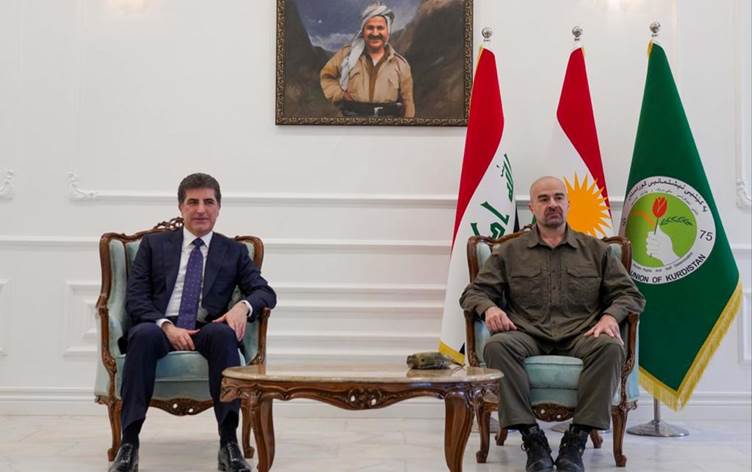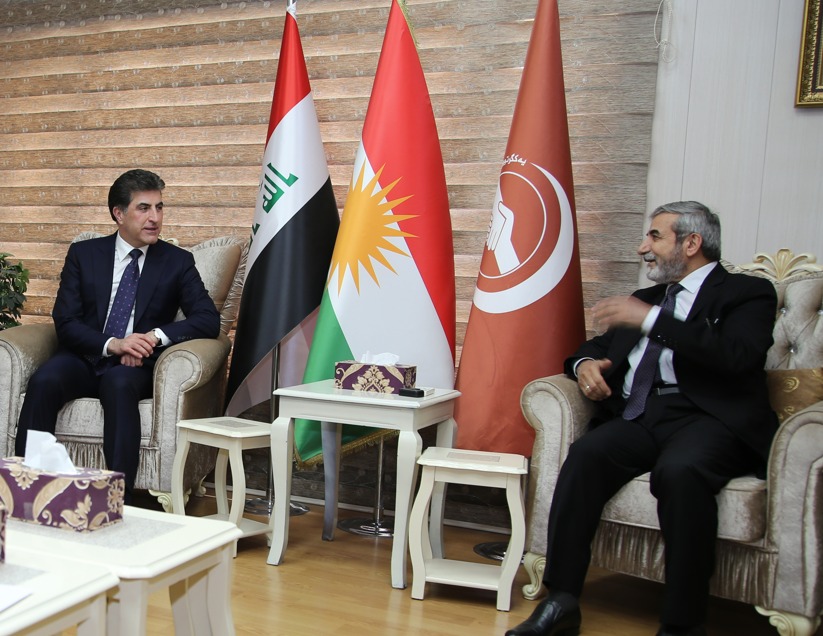
Kurdistan Region President Nechirvan Barzani met with co-chair of the Patriotic Union of Kurdistan (PUK) Bafel Talabani in Sulaimani on May 22, 20222. Photo: PUK Media
ERBIL, Kurdistan Region - Kurdistan Region President Nechirvan Barzani praised relations between the Kurdistan Democratic Party (KDP) and the Patriotic Union of Kurdistan (PUK) on Sunday as he concluded an important visit to the latter's stronghold of Sulaimani, saying their ties are “better than before.”
Barzani visited Sulaimani and met with a series of senior officials from different political parties in a bid to resolve differences in the Kurdistan Region, with the KDP and PUK recently renewing efforts to end the Region's political turmoil.
"The meetings emphasized that we all have to work together for the benefit of the Kurdistan Region and its people," said Barzani before ending his trip to Sulaimani, adding that relations between KDP and PUK are "much better than before."
President Barzani held meetings with senior PUK officials, the Change Movement (Gorran), Kurdistan Justice Group (Komal), and the Kurdistan Islamic Union (KIU) in a bid to resolve differences in the Region. He also met with the KDP's Sulaimani branch.
Secretary-General of the KIU Salahaddin Bahadin told Barzani that "the citizens of the Kurdistan Region can no longer tolerate this chaotic situation. The disappointment of citizens in Iraq and the Region requires officials to think about the future," read a statement published on Bahadin’s Facebook.
Bahadin also stated that the Region is in “danger” due to political instability between the ruling KDP and PUK.
Gorran spokesperson Dler Abdulkhaliq told Barzani that PUK-KDP ties have had a “very bad impact” on the Kurdistan Region, noting that they pose an “internal” threat to the Region.
Earlier on Sunday, Barzani said that the differences between the Region's two ruling parties are not major, but are exacerbated by "mental barriers" that are made during meetings.
“Truth be told, we do not have very big differences that are unresolvable, but sometimes, we make mental barriers in front of meeting each other. This happens a lot of times between the Patriotic Union of Kurdistan and the Kurdistan Democratic Party,” he said in a speech delivered during the graduation ceremony of Qalachwalan Military Academy.
"We should sit at the meeting table and fix issues. Our future lies together," Barzani told reporters at the conclusion of his visit.
It’s great to be back to Silemani today. I attended graduation ceremony of Qalacholan Military College and met with political leaders.
— Nechirvan Barzani (@IKRPresident) May 22, 2022
We must stay united to address current challenges and keep securing the rights of the people of Kurdistan Region. pic.twitter.com/7eZBUGo9cA
The KDP and PUK have taken opposing sides in the quest to form Iraq's next government, with the KDP joining forces in a tripartite alliance with the Sadrist bloc and the Sunni Sovereignty Alliance, and the PUK allying with the Coordination Framework, a pro-Iran Shiite alliance.
Furthermore, the two leading Kurdish parties have failed to compromise on a candidate for the Iraqi presidency, as the KDP has fielded Reber Ahmed in opposition to the PUK’s choice of the incumbent Barham Salih.
Barzani’s senior advisor Dilshad Shahab on Saturday told Rudaw his visit to Sulaimani is “very important and will have a great impact on breaking the barriers between the political parties and ending the political deadlock in the Kurdistan Region.”
When asked about issues between Erbil and Baghdad, Barzani stated that "we as the Kurdistan Region ask that these issues be resolved according to the Iraqi constitution and we ask Baghdad to cooperate according to the constitution."
Iraq's Federal Supreme Court mid-February ruled against the Kurdistan Region's oil and gas law that regulates the oil sector in the Region, putting its industry in jeopardy.
The KRG passed its oil and gas law in 2007, enabling it to administer and develop its own oil and gas resources.
The top court's decision found the law to be "unconstitutional," and therefore struck down the legal basis for the independence of the Region's oil and gas sector.
Delegations from Erbil have visited Baghdad ever since for negotiations, but none of the meetings have been fruitful.








Comments
Rudaw moderates all comments submitted on our website. We welcome comments which are relevant to the article and encourage further discussion about the issues that matter to you. We also welcome constructive criticism about Rudaw.
To be approved for publication, however, your comments must meet our community guidelines.
We will not tolerate the following: profanity, threats, personal attacks, vulgarity, abuse (such as sexism, racism, homophobia or xenophobia), or commercial or personal promotion.
Comments that do not meet our guidelines will be rejected. Comments are not edited – they are either approved or rejected.
Post a comment